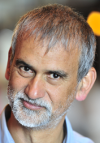21st Karlsruhe Dialogues - Speakers
Morning Panel Discussion - What Needs to Be Done? Thoughts and Experiences for the Protection of Pluralistic Society
Mike van Graan
Speaker

Van Graan graduated from the University of Cape Town with a BA Honours Degree in Drama and has served in leadership positions in a variety of local and continental arts and culture organisations, for instance as Director of the Community Arts Project, Projects Officer for the Congress of South African Writers, Secretary General of Arterial Network, and Executive Director of the African Arts Institute.
After the country’s first democratic elections in 1994, he was appointed as a Special Adviser to the first minister responsible for arts and culture where he played an influential role in shaping post-apartheid cultural policies.
He was appointed as Artscape’s Associate Playwright from 2011–2014 and is considered one of South Africa’s leading contemporary playwrights, having garnered numerous nominations and awards for his plays that interrogate the post-apartheid South African condition.
He received the Standing Ovation Award at South Africa’s 2012 National Arts Festival for his sustained contribution to the festival as a writer and activist, and in 2013 was appointed as the inaugural Festival Playwright where four of his plays were showcased. To date, he has written 27 plays, with Pay back the Curry, a satirical revue, and When Swallows Cry being the most recent.
Statements
1. In your opinion, which “enemies” pose the greatest threat to pluralistic societies?
I think the two biggest enemies are ignorance and arrogance. Ignorance about ‘others’ – and then we make all kinds of assumptions about ‘them’ based on misinformation and stereotypes. And arrogance – the belief that our values, ideas, worldviews, etc. are the best, and that everyone who subscribes to a different culture is uncivilised, barbaric, and in need of evolutionary development. We are different, not ‘better’.
2. Public trust in elites and the media has been declining in recent years. What do you think can be done in order to restore this trust?
I am not sure that such trust needs to be restored. If we truly believe in democracy, then it is not so much about putting trust in elected officials or in public or privately owned media, but rather in ourselves. Technology has made it possible for us to disseminate our own ideas, and to share the ideas and information we trust and believe in ourselves. It is about empowering ourselves to be active citizens to hold accountable those who shape and influence our lives (such as the media) and those who seek to govern us (politicians). We need to empower ourselves rather than elites and the media, who already have power.
3. In pluralistic societies, how can awareness of the advantages of freedom – and the appreciation thereof – be raised, in particular when it comes to those who lack experiences with unfreedom?
In the long term, this is done through education and lived experience. In the short term, it is not only about educating those who are new to so-called ‘free’ societies about those freedoms, but also citizens of ‘free’ societies learning and being educated about the circumstances, life experiences, and value systems of those who come from different social and cultural backgrounds. Too often, ‘pluralism’ is understood as assimilation – the new and the weak and the minorities being integrated into the dominant, hegemonic way of life on the terms set by the dominant – rather than co-existence, which is what pluralism would demand more. There needs to be more humility on the part of the dominant, and an openness and willingness to learn from and be influenced by the new, the different, the less powerful. It is counterintuitive, but necessary in order to build really pluralistic, democratic societies of the future.
